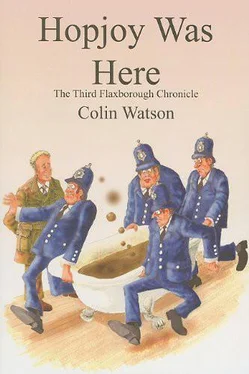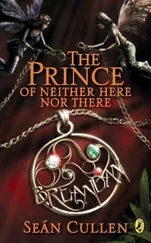It was an unexceptional face that he could not recall having seen before, although, as Periam was a shopkeeper in a fairly busy part of the town, it was more than likely that he had done so. The features were very smooth, like those of an elderly baby, and their sulky solemnity was emphasized by a big, round, fleshy chin. The posture of gaiety prescribed for the occasion had been adopted by Mr Periam with all the insouciance of a man with suspected rib fractures submitting to X-ray examination.
“He doesn’t look very happy,” Purbright ventured.
“A terribly conscientious boy,” Mrs Sayers explained. “Actually he has a lovely sense of fun, but in a quiet way. He’s not one for roystering about. I think it’s only loyalty, really, that’s kept him in things like this. He’s still a regular Gang Show man too, you know.”
“Does Mr Hopjoy go in for theatricals?”
Mrs Sayers puffed contemptuously. “Not on the stage, he doesn’t. But he’s an actor, all right, take it from me.”
“I’d rather like his picture as well.”
“I don’t know where you’ll get one. By all accounts he flits around too much to be photographed. Of course, some woman might help you there. Or even,” she added darkly, “the police.”
Purbright, pocketing the photograph of the Operatic Society, searched her face for evidence either of amnesia or an unexpected sense of humour.
“No, honestly,” Mrs Sayers soberly persisted, “it wouldn’t surprise me one little bit.”
Chapter Four
Towards conference with the Chief Constable of Flaxborough and one selected senior officer of his force smoothly sped the man known as Ross,
He gazed with languid appreciation through the windscreen of the Bentley—an ordinary Bentley save that its radiator cowl was of gunmetal and of slightly more assertive radius than a standard model’s—at the June countryside. He already had booked rooms for his companion and himself at the Royal Oak, Flaxborough, from a public call box on the road from London, using the names Smith—his own favourite among disarmingly improbable hotel aliases—and Pargetter.
Pargetter-to-be did not seem to be enjoying the drive as much as Ross. As the long car swung up from the last declivity in the wooded, river-watered lowlands below Flaxborough Ridge and gained the straight highway leading to the town, he shifted irritably in his seat and swivelled his head in an effort to read grass-collared milestones.
Ross did not care for the back view of his companion’s head; the gleam of baldness bobbed distractingly in the left corner of his vision and he had begun to receive the curious impression that it emanated from a beard-ringed featureless face.
“Harry,” he said sharply, “what on earth are you looking for?”
The white patch disappeared and a sallow oval one took its place. “I’ve been trying to see how much farther we have to go. I think there was a three on that last milestone.”
Henry Pumphrey spoke rapidly but with a careful emphasis that involved his facial muscles in a good deal of exercise. At the end of each sentence he lightly flicked his tongue across his upper lip. He had a residual North Country accent.
“Three miles will be about it,” Ross agreed. He had glanced at the dashboard and received from it, apparently, information no less precise than Pumphrey’s. Now, his hands laid delicately upon the wheel as upon an open missal, he watched the gradual recession of trees and hedges from the road ahead and their replacement by houses, a filling station, some shops. Cyclists—Flaxborough cyclists who seem grafted to their machines to form unities as formidable and unpredictable as centaurs—swooped out of side roads. Green double-decked buses which had been ticking over in ambush loomed suddenly at intersections. With the serenity of extreme old age, three inmates of an almshouse crossed and re-crossed the carriageway, gently smiled resignation to survival for another twenty-four hours, and filed back into their refuge. A pair of dogs, panting and oblivious, coupled on the road’s crown and performed a six-legged waltz around a keep-left bollard. Children darted between cars and laid down objects which they then watched excitedly from the pavement.
All these hazards were negotiated with smooth synchronization by the Bentley, presided over by Ross. He remained calm, indulgent, interested.
Just short of a large, pale blue sign mounted on posts, Ross drew the car to a halt. At his request Pumphrey wound down the window on his side and Ross leaned across him, calling to the squat, sceptical looking man who lounged against one of the sign’s supports.
“I say, I wonder if you could tell me in which part of the town I can find the police headquarters.”
The man silently regarded the casual balance of the traveller’s forward-thrust shoulder, its suiting of hand-blended Newbiggin wool and linen dyed to the colour of Chartres Cathedral, the musicianly hands that sprang so surprisingly from wrists as powerful as a road driller’s. He shifted his glance to Ross’s face; a patient face, not very handsome, the face of a questioner and connoisseur, a trader—in the last resort—of pain.
When the man’s slow scrutiny reached Ross’s eyes he saw they were lifted to absorb the message of the tall, clean lettering above them. FLAXBOROUGH WELCOMES CAREFUL DRIVERS.
The man politely awaited the descent of Ross’s gaze before he carefully cleared his throat and spoke.
“Piss off,” he said.
The Chief Constable of Flaxborough, Mr Harcourt Chubb, received his London visitors with a degree of affability that he calculated would fall just short of making them feel entitled to put him to any trouble. He introduced Purbright, who found Ross’s handshake a shade prolonged and somewhat exploratory, and Pumphrey’s over-firm, like that of a man for ever determined to make his first friend.
All but Mr Chubb sat down. He stepped back and relaxed his tall, lean body against the mantelpiece, with one arm extended along it.
Ross glanced at him, then at Purbright.
“I assume, inspector, that Mr Chubb has explained the nature of our interest in this little affair of yours at...Flaxborough.” The small hesitation was eloquent of the orientation difficulties of the much travelled. Perhaps the day before it had been Istambul or Adelaide that needed to be slotted into some similar interview.
Purbright inclined his head. “I do understand that one of these missing people, a man called Hopjoy, happens to be...”
“...One of our fellows, yes.” Ross completed the identification with brisk despatch, then looked intently at Purbright. “Of course, you see how we might be placed?”
“Not precisely, sir.”
Pumphrey’s cheek twitched with disapproval of the provincial policeman’s obtuseness. “It simply means that, security-wise...” He stopped and turned his eyes, like those of an El Greco Christ, upon Ross.
Ross smiled patiently. “Thimble Bay. Let’s start from there, shall we? I don’t have to tell you about the Thimble Bay Establishment. Couldn’t, anyway—not above Sensitivity Three, and you wouldn’t be much wiser if I did. But you’ll understand the place is very much our pigeon. Hence Hopjoy. Among others, naturally.”
“That much I had gathered,” Purbright said. “Of course, Thimble Bay is not usually considered to be in this locality, sir.”
“Really?” Ross sounded surprised. He glanced across at the Chief Constable, as a misled traveller might appeal direct to the king of the country whose inhabitants have proved wayward. “How far, Mr Chubb, would you say Thimble Bay is from here?”
The Chief Constable diffidently waved one of his fine flexible, hands. “I really can’t tell you. Mr Purbright will know.”
Читать дальше

![Fredrik Backman - Britt-Marie Was Here [Britt-Marie var här]](/books/61260/fredrik-backman-britt-marie-was-here-britt-thumb.webp)










